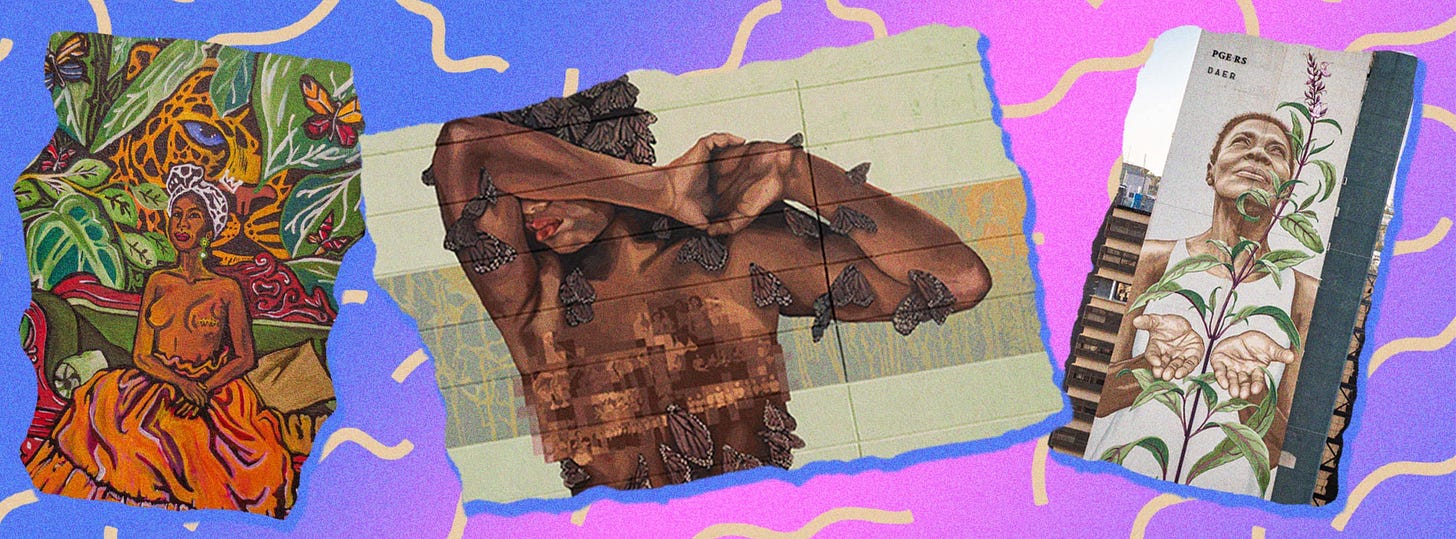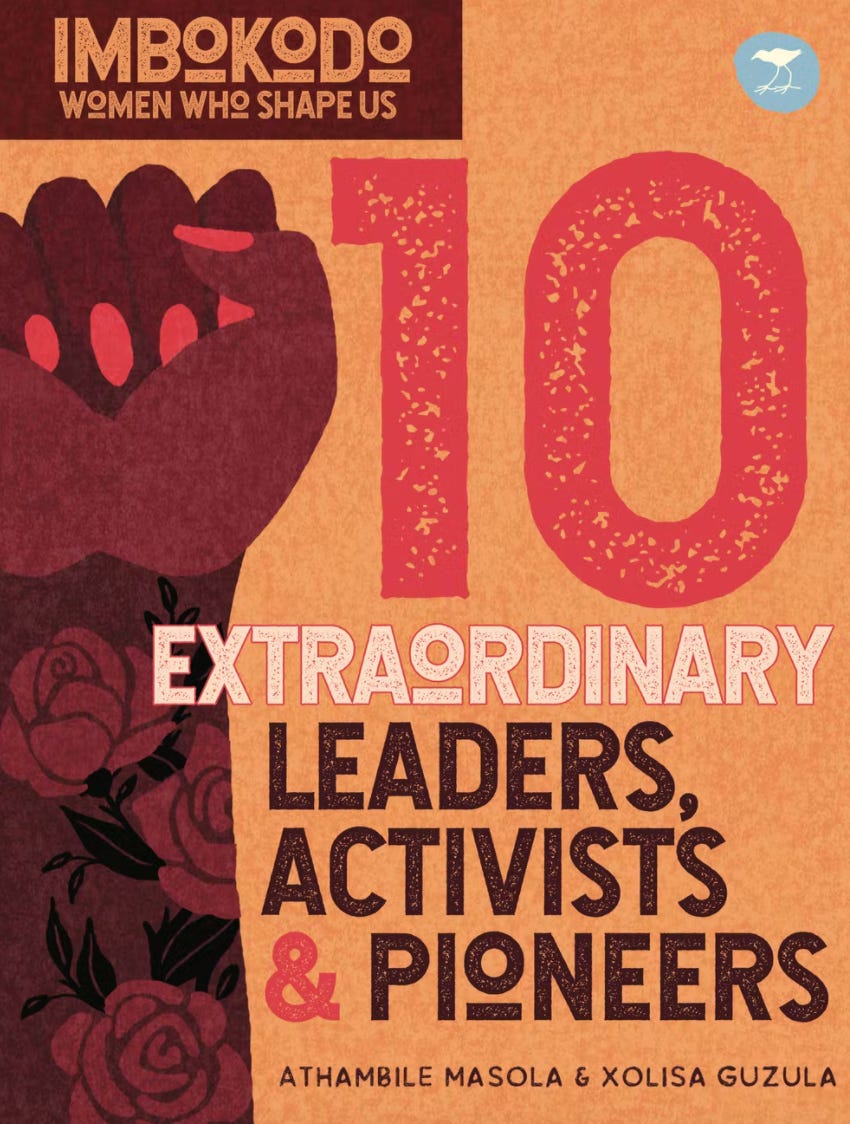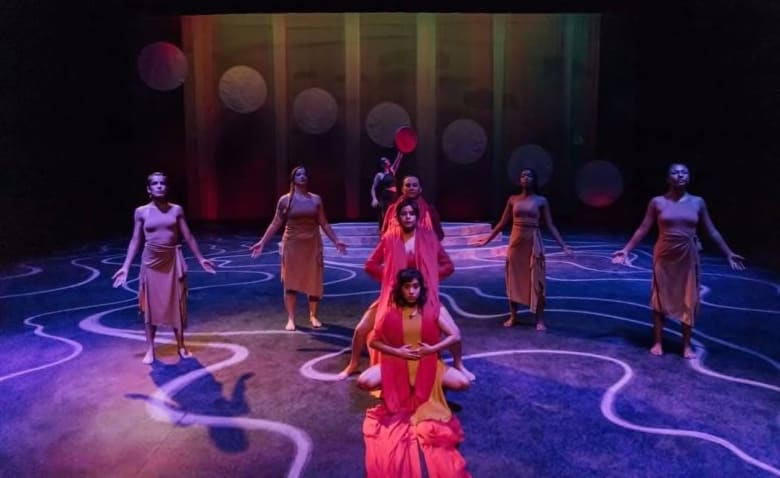Global Roundup: Feminist Street Art in Latin America, Trans Women Trapped in Ukraine, Children’s Books on South African Women, Black Queer & Trans Parents' Group, Play Tells Story of Indigenous Women
Curated by FG Samiha Hossain
Via refinery29
Many of today’s Latin American practitioners of street art emerge as fervent champions for Black and Indigenous women in their regions. Street muralists across the region are incorporating important issues into their art such as the growing femicide rates, reproductive injustice, and gender pay gaps that disproportionately affect Black and Indigenous women. Refinery29 highlights the work of three street artists.
Victoria Onélien, 24, is a Haitian street artist and photographer whose art raises awareness about the issues of Haiti’s environment, and its beauty and need to be protected, which she sees as a direct correlation with how women are treated there.
The [femicide rates] in Haiti, like in DR, magnifies my anxiety because I, like many other women, do have a strong chance of being a victim of rape if I'm out alone. But I move forward and educate the younger ones so that they can live a little safer and know that they do not have to suffer in silence from violence at home or outside. - Victoria Onélien
Vicky recently participated in the Aba Feminicide Campaign, where she employed stencils to represent a strong woman shouting “No” to violence against women. For the visual aspect of the campaign, she and some girls sprayed stencils on all the walls in different areas of Port-au-Prince. Now, she is working on a digital series and March exhibition honouring the strength and resilience of Haitian women across sectors, including merchants, women in the police force, doctors, mothers, politicians, and the poor or homeless.
Raysa Raquel Rodriguez Garcia, alongside her comrades at Colectivo Moriviví, include muralism, community-led muralism, and protest performance/actions in her artistic productions. Together, their work is about democratizing art and bringing the narratives of Puerto Rican communities to the public sphere.
Patriarchy, colonialism, and narratives about race, body, and power are themes that resonate in the work of Colectivo Moriviví. Together, we create murals by, for, and with the community, to represent the realities of these people, realities that are also ours. - Raysa Raquel Rodriguez Garcia
As a feminist muralist-activist living in Carolina, Puerto Rico, a great deal of Raysa’s collective works honour the plight of Black women and explore Black feminist politics. Her work underscores how women in Puerto Rico have the least access to resources and job opportunities, and yet, are the worst paid, hypersexualized, and violated on a daily basis.
…We, women, are the ones who lead the spaces of resistance on this island. We have achieved much through our fight and struggle, but we still have much more to achieve. - Raysa Raquel Rodriguez Garcia
Mauro Neri is a São Paulo visual artist and street muralist who creates “infograffiti” to address injustices through useful painted information in the streets of Brazil. A lot of his work portrays important figures and honours Black and Indigenous women. His latest masterpiece was recently unveiled in Porto Alegre, the city capital of Rio Grande do Sul estado. The showpiece honours their own Beatriz Gonçalves Pereira, affectionately called Bia da Ilha or Mãe Bia by her “spiritual sons and daughters.”
I think that portraying Black women in works of art, especially in street art, is something very urgent and necessary today. The reality for women continues to be unfavourable despite the injustices against them being increasingly visible. - Mauro Neri
Zi Faámelu is a trans Ukrainian singer. (Facebook/ Zi Faámelu) via Pink News
Zi Faámelu is a musician best-known in Ukraine for competing in the competition show Star Factory. She has been hiding in her Kyiv apartment as gunfire and missiles get closer and she is starting to run out of food. Faámelu is scared to leave home not just because of war, but also because she fears for her safety as a trans woman.
Many people have guns and weapons… It can be an excuse for violence. This is a very scary situation. - Zi Faámelu
Activists on the ground told the TGEU (Transgender Europe) network that trans people with documents that do not match their gender “cannot pass internal check-points”, and that trans women of fighting age with a male gender marker on their passport are being made to stay in the country as potential recruits. Ukrainian men – and by extension, any person with a male gender marker on their legal documents – aged 18 to 60 have been banned from leaving the country.
Despite the fear, Faámelu still has faith that Ukrainian forces can defeat Russia.
There’s something about Ukrainians, they are very optimistic and joyful people… They never give up…You don’t know if you’re going to be alive the next morning. So what are you going to do? I just prefer to dance in the kitchen, to be honest. - Zi Faámelu
Jacana Media via The Conversation
A new series of books called Imbokodo: Women Who Shape Us explores the neglected histories of South African women. Geared at younger readers, there are three books in the series: 10 Extraordinary Leaders, Activists & Protesters; 10 Inspiring Singers, Writers & Artists; and 10 Curious Inventors, Healers & Educators. The authors are Xolisa Guzula, an early literacy specialist and children’s author, and Athambile Masola, a historian and poet. The books are available in isiXhosa, isiZulu, Afrikaans, seSotho and English. The Conversation discussed the project with Guzula and Masola.
Guzula says that Imbokodo is an isiZulu word that means “rock”, often used in the saying, “Wathint’abafazi, wathint’imbokodo, uzakufa! Ubobhasopa!” (“You strike women, you strike a rock, you will be crushed! You should be careful!”). This chant was used by women during the struggle for liberation in South Africa.
Women are seldom shown as pioneers, inventors and creatives themselves. Patriarchal culture dictates that women use their marriage surnames such that their efforts add value to their husband’s lineage rather than their birth families. In Imbokodo we try to provide each and every woman’s maiden surname. - Xolisa Guzula
Women’s stories are often told in relation to men. They are also often shown as working alone, when in reality there was a lot of collaboration. Masola notes that women have told their own stories through memoirs and essays, but much of the ways in which South Africa’s history is told is through political history and grand movements. Therefore, it is assumed that the stories about war are the stories of men.
Guzula and Masola have been collecting content for the historical figures they included for years. However, making sections for the contemporary women was more challenging. They wanted to include women who have not received as much attention in previous works, as well as interdisciplinary women and people who are custodians of indigenous knowledge systems.
Through their books, Guzula and Masola want children to see that women have agency and power to create change and shape the world.
We hope that young readers will question the way they are taught history in schools. I hope that many of them will be curious about the stories that are yet to unfold, particularly in their own families. - Athambile Masola
Mia Cooley, founder of Black LGBTQ+ Moms and Parents. via Xtra
In 2019, Mia Cooley founded the Facebook group Black LGBTQ+ Moms and Parents, which originated with the intention of nurturing the relationship that Black mothers and parents have with their kids. The online community consists of an extensive network of Black queer and trans people, boasting more than 3,000 members.
Cooley, a queer, pansexual parent of three kids, says she started Black LGBTQ+ Moms and Parents out of necessity, after experiencing how mainstream online groups for moms were not inclusive of LGBTQ2S+ parents of colour. She recalled facing numerous microaggressions and not feeling a true sense of belonging.
I was really struggling in other mommy groups and queer groups with just having to consistently humanize myself, validate our family structures and dynamics, and whatever journeys we took to parenting. While I was looking for support and sisterhood, I wasn’t getting that, and it was really, really frustrating. - Mia Cooley
Cooley notes the discrimination she would face in health care, including being asked “where’s you husband?” She says that it is already dangerous to give birth as a Black person and to live as a queer person.
Members of Black LGBTQ+ Moms and Parents hail predominantly from the U.S., Canada and the United Kingdom, and the Facebook group consists of posts from families navigating daily life as well as virtual meetups in which parents share their unique challenges and seek guidance. Most information sessions take place online so resources can be shared broadly, whether it’s assistance with financial planning, access to fertility specialists or help with finding legal aid.
But for Pride Month this year, Cooley hopes members of Black LGBTQ+ Moms and Parents can build those connections in person. The group is planning its largest in-person gathering ever: the Black Parent PRIDE Summit, set to take place in Atlanta, Georgia, from June 26 to 27. More than 30 speakers and 150 attendees are expected at the two-day conference.
The all-Indigenous-women cast of Ayita includes eight performers, four dancers, one drummer. It premiers at SkirtsAfire Festival on Thursday. (Noella Steinhauer) via CBC
Ayita tells the story of three generations of Indigenous women: past, present and future. Created and written by Teneil Whiskeyjack, a Cree woman from Saddle Lake First Nation, the story is about her healing journey and what she learns along the way.
It's really a story of an Indigenous woman liberating herself into her own story of peace. - Teneil Whiskeyjack
The cast is all Indigenous women, including performers, dancers, and a drummer. Whiskeyjack will play the present version of Ayita. The play will go beyond theatre to include text, movement and sound.
The seed for Ayita started in 2019 during her thesis project as a drama major at Concordia University. But it wasn't until the past year that she started to work on putting it all together. For Ayita, she went to ceremony, listened to knowledge keepers and other Indigenous women. Ultimately, the process helped her own healing journey and she was able to find “womb healing.”
We don't hear much of womb healing, and that's a lot of where our own inner fire is. Going into the womb, we don't only heal ourselves, we help heal our matrilineal line; our grandmothers, our mothers, our daughters and the people who came after and before us. - Teneil Whiskeyjack
Samiha Hossain (she/her) is a student at the University of Ottawa. She has experience working with survivors of sexual violence in her community, as well as conducting research on gender-based violence. A lot of her time is spent learning about and critically engaging with intersectional feminism, transformative justice and disability justice.
Samiha firmly believes in the power of connecting with people and listening to their stories to create solidarity and heal as a community. She refuses to let anyone thwart her imagination when it comes to envisioning a radically different future full of care webs, nurturance and collective liberation.









Great, sobering, hopeful, and heavy round up.